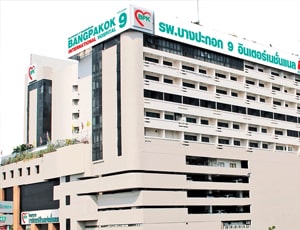Treatment cost

Bangpakok 9 International Hospital located in Bangkok, Thailand is accredited by JCI. Also listed below are some of the most prominent infrastructural details:

Plaque is the accumulation of fat, cholesterol, calcium, and other chemicals in arteries. Plaque can either restrict blood flow or rupture, resulting in blood clots. Atherosclerosis is the accumulation of plaque. Atherosclerosis is treated with an atherectomy.
Ather refers to a fatty plaque. The term "ectomy" refers to the surgical removal of something. This treatment clears the arteries from fatty plaque. This is a minimally invasive vascular therapy for people with Peripheral Arterial Disease (PAD).
This procedure to remove plaque from an artery is known as an atherectomy (blood vessel). Plaque removal widens the artery, allowing more blood to flow freely to the heart muscles. With small revolving blades or a laser on the end of a catheter, the plaque is shaved or vaporised away during an atherectomy (a thin, flexible tube).
Patients with very hard plaque or those who have already had angioplasty and stents but still have plaque restricting blood flow may benefit from surgical atherectomy.
It's a minimally invasive technique that doesn't require a hospital stay and has a quick recovery time. Other advantages include:
In a cardiac catheterization lab, the atherectomy procedure is conducted. Sedatives are given to the patient before an atherectomy to assist him or her relax. The catheter is then carefully placed into an artery, typically in the groyne or upper leg. It is subsequently guided toward the heart through the blood vessel. Once it's in place, dye is delivered into the coronary arteries via the catheter. An X-ray is conducted to assist the physician in locating the obstructed or narrowed area. The physician then cuts or vaporises plaque with tiny blades or a laser linked to the catheter's end. An angioplasty or stent procedure may be performed after the atherectomy. The catheter is withdrawn after the treatment is finished. After around 24 hours, the majority of patients are able to return home.
The recovery process is very simple. The patient is kept still for 3-6 hours post-procedure to ensure the incision stops bleeding. The pain at the incision site is very less and will be healed at a short time. The area is checked periodically for bleeding. Little swelling might be common in the initial days. The hospital stay lasts for a day or two usually. The patient is discharged after close monitoring and no complications for two days. The patient is given wound care instructions. The patient is advised to do minimal physical activity for a few days. They can resume their normal activities in three weeks. The patient will also be given a few follow up medications. The patient should ensure that the medications are followed for a speedy recovery.
Ask your healthcare adviser for the best multiple options and choose the one that meets your expectations
Atherectomy cost in Bangkok varies from one hospital to the other. Some of the best hospitals for Atherectomy offer a comprehensive package that covers the end-to-end expenses related to investigations and treatment of the patient. The Atherectomy cost in Bangkok includes the cost of anesthesia, medicines, hospitalization and the surgeon's fee. A prolonged hospital stay due to delayed recovery, new diagnosis and complications after surgery may increase the cost of Atherectomy in Bangkok.
Many hospitals in Bangkok perform Atherectomy. The top hospitals for Atherectomy in Bangkok include the following:
After discharge from the hospital, the patient has to stay for another 13 days in the country for complete recovery. This time frame is important to ensure that the surgery was successful and the patient is fit to fly back.
There are certain additional cost that the patient has to pay apart from the Atherectomy cost. These are the chanrges for daily meals and hotel stay outside the hospital. The extra charges may vary from 25 USD.
The patient is supposed to stay at the hospital for about 2 Days after Atherectomy surgery for monitoring and care. The doctors team review the patient's recovery during this time with the help of blood tests and imaging scans. Once they feel that everything is on track, the patient is discharged.
There are about 1 Hospitals in Bangkok that offer Atherectomy to international patients. These hospitals have the required expertise as well as infrastructure available to handly patients who need Atherectomy. These hospitals comply with all the rules and regulations as dictated by the regulatory bodies and medical association in Bangkok
Some of the most sought after doctors for Atherectomy in Bangkok are: